Ethical Considerations: Robots Replacing Humans in the Future?
VerifiedAdded on 2023/06/14
|8
|1617
|473
Essay
AI Summary
This essay examines the ethical question of whether robots should replace humans in the future, considering the moral implications of robot actions. It discusses the efficiency of AI-powered robots in various tasks and the ethical issues arising from their potential lack of empathy and moral compass. The essay identifies relevant facts such as unemployment, inequality, dealing with robot errors, security concerns, bias, and the potential for AI dominance. It applies the theory of Utilitarianism to analyze the positive impacts (increased productivity, societal benefits) and negative impacts (unemployment, potential for misuse) of robot replacement. The conclusion suggests that replacing humans with robots would be unethical based on Utilitarianism principles due to the potential for increased economic disparity, unemployment, and misuse against humanity.
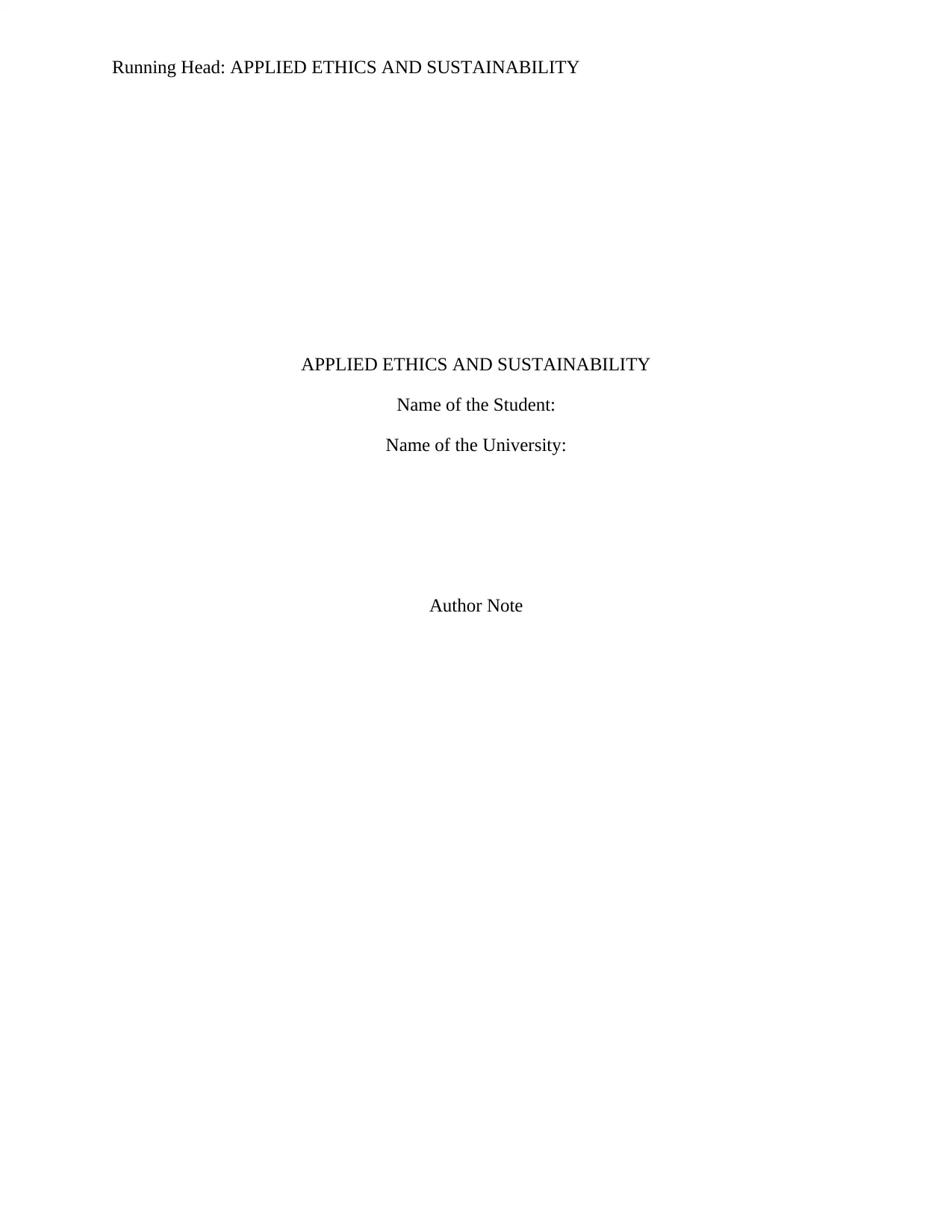
Running Head: APPLIED ETHICS AND SUSTAINABILITY
APPLIED ETHICS AND SUSTAINABILITY
Name of the Student:
Name of the University:
Author Note
APPLIED ETHICS AND SUSTAINABILITY
Name of the Student:
Name of the University:
Author Note
Paraphrase This Document
Need a fresh take? Get an instant paraphrase of this document with our AI Paraphraser

1
APPLIED ETHICS AND SUSTAINABILITY
The Ethical Question
The Ethical Question in consideration is whether Robots should replace humans in future and
whether the actions of Robots will encompass moral standards.
Background
Robots empowered by artificial intelligence have been proven to be very efficient in
conducting all kinds of operations that were being done by humans till date. Detecting fraud,
conducting research, optimization of logistics translating languages can all be done by robots in
the modern era of technological advancement (Russell and Norvig, 2016). These Robots, driven
by artificial intelligence aim to revolutionize the modern society. Tech giants such Microsoft,
Amazon, IBM and Facebook have been conducting research in the field of artificial intelligence
and believe that artificial intelligence has enormous potential to revolutionize the world.
However, with the advent of this rapidly emerging technology, several ethical issues have
surfaced. The question of whether robots empowered by such artificial intelligence will be able
to make ethical decisions has been raised. People are worried about the lack of empathy of the
machines and are questioning whether the actions of the machines will be guided by the moral
principles (Bostrom and Yudkowsky 2014). Another question that has surfaced is how should
robots be punished if they violate any of the duties assigned or fail to act according to moral
standards. Robots replacing humans could even have adverse effects on humanity. If the jobs
that are performed by humans are replaced by Robots, many people could lose their jobs. Since
the cost of employment is rising all over the world, replacing workers in factories with robots
would lower the cost of manufacturing and production. However, interaction between humans
and robots has brought many legal implication and considerations upon the employers. Such
APPLIED ETHICS AND SUSTAINABILITY
The Ethical Question
The Ethical Question in consideration is whether Robots should replace humans in future and
whether the actions of Robots will encompass moral standards.
Background
Robots empowered by artificial intelligence have been proven to be very efficient in
conducting all kinds of operations that were being done by humans till date. Detecting fraud,
conducting research, optimization of logistics translating languages can all be done by robots in
the modern era of technological advancement (Russell and Norvig, 2016). These Robots, driven
by artificial intelligence aim to revolutionize the modern society. Tech giants such Microsoft,
Amazon, IBM and Facebook have been conducting research in the field of artificial intelligence
and believe that artificial intelligence has enormous potential to revolutionize the world.
However, with the advent of this rapidly emerging technology, several ethical issues have
surfaced. The question of whether robots empowered by such artificial intelligence will be able
to make ethical decisions has been raised. People are worried about the lack of empathy of the
machines and are questioning whether the actions of the machines will be guided by the moral
principles (Bostrom and Yudkowsky 2014). Another question that has surfaced is how should
robots be punished if they violate any of the duties assigned or fail to act according to moral
standards. Robots replacing humans could even have adverse effects on humanity. If the jobs
that are performed by humans are replaced by Robots, many people could lose their jobs. Since
the cost of employment is rising all over the world, replacing workers in factories with robots
would lower the cost of manufacturing and production. However, interaction between humans
and robots has brought many legal implication and considerations upon the employers. Such
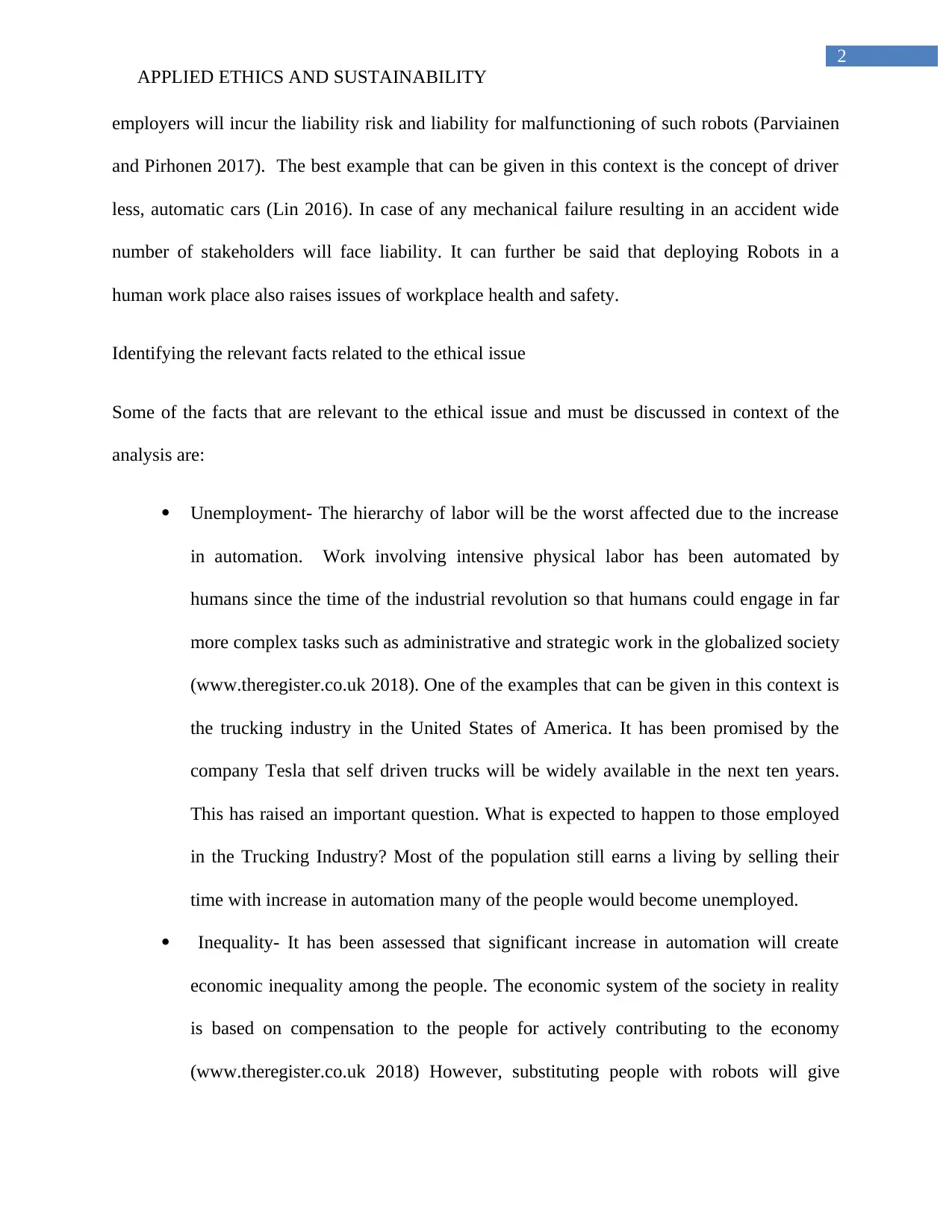
2
APPLIED ETHICS AND SUSTAINABILITY
employers will incur the liability risk and liability for malfunctioning of such robots (Parviainen
and Pirhonen 2017). The best example that can be given in this context is the concept of driver
less, automatic cars (Lin 2016). In case of any mechanical failure resulting in an accident wide
number of stakeholders will face liability. It can further be said that deploying Robots in a
human work place also raises issues of workplace health and safety.
Identifying the relevant facts related to the ethical issue
Some of the facts that are relevant to the ethical issue and must be discussed in context of the
analysis are:
Unemployment- The hierarchy of labor will be the worst affected due to the increase
in automation. Work involving intensive physical labor has been automated by
humans since the time of the industrial revolution so that humans could engage in far
more complex tasks such as administrative and strategic work in the globalized society
(www.theregister.co.uk 2018). One of the examples that can be given in this context is
the trucking industry in the United States of America. It has been promised by the
company Tesla that self driven trucks will be widely available in the next ten years.
This has raised an important question. What is expected to happen to those employed
in the Trucking Industry? Most of the population still earns a living by selling their
time with increase in automation many of the people would become unemployed.
Inequality- It has been assessed that significant increase in automation will create
economic inequality among the people. The economic system of the society in reality
is based on compensation to the people for actively contributing to the economy
(www.theregister.co.uk 2018) However, substituting people with robots will give
APPLIED ETHICS AND SUSTAINABILITY
employers will incur the liability risk and liability for malfunctioning of such robots (Parviainen
and Pirhonen 2017). The best example that can be given in this context is the concept of driver
less, automatic cars (Lin 2016). In case of any mechanical failure resulting in an accident wide
number of stakeholders will face liability. It can further be said that deploying Robots in a
human work place also raises issues of workplace health and safety.
Identifying the relevant facts related to the ethical issue
Some of the facts that are relevant to the ethical issue and must be discussed in context of the
analysis are:
Unemployment- The hierarchy of labor will be the worst affected due to the increase
in automation. Work involving intensive physical labor has been automated by
humans since the time of the industrial revolution so that humans could engage in far
more complex tasks such as administrative and strategic work in the globalized society
(www.theregister.co.uk 2018). One of the examples that can be given in this context is
the trucking industry in the United States of America. It has been promised by the
company Tesla that self driven trucks will be widely available in the next ten years.
This has raised an important question. What is expected to happen to those employed
in the Trucking Industry? Most of the population still earns a living by selling their
time with increase in automation many of the people would become unemployed.
Inequality- It has been assessed that significant increase in automation will create
economic inequality among the people. The economic system of the society in reality
is based on compensation to the people for actively contributing to the economy
(www.theregister.co.uk 2018) However, substituting people with robots will give
⊘ This is a preview!⊘
Do you want full access?
Subscribe today to unlock all pages.

Trusted by 1+ million students worldwide
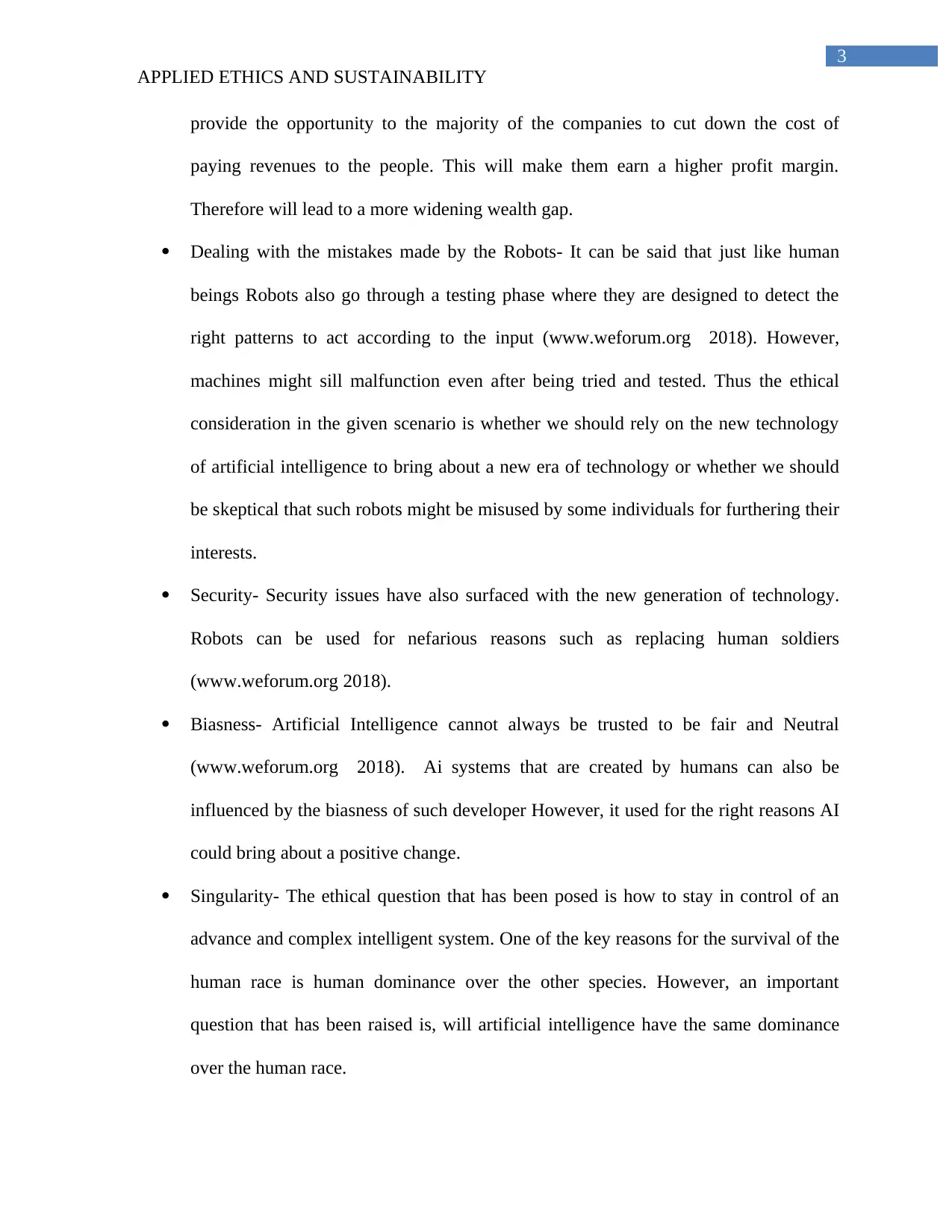
3
APPLIED ETHICS AND SUSTAINABILITY
provide the opportunity to the majority of the companies to cut down the cost of
paying revenues to the people. This will make them earn a higher profit margin.
Therefore will lead to a more widening wealth gap.
Dealing with the mistakes made by the Robots- It can be said that just like human
beings Robots also go through a testing phase where they are designed to detect the
right patterns to act according to the input (www.weforum.org 2018). However,
machines might sill malfunction even after being tried and tested. Thus the ethical
consideration in the given scenario is whether we should rely on the new technology
of artificial intelligence to bring about a new era of technology or whether we should
be skeptical that such robots might be misused by some individuals for furthering their
interests.
Security- Security issues have also surfaced with the new generation of technology.
Robots can be used for nefarious reasons such as replacing human soldiers
(www.weforum.org 2018).
Biasness- Artificial Intelligence cannot always be trusted to be fair and Neutral
(www.weforum.org 2018). Ai systems that are created by humans can also be
influenced by the biasness of such developer However, it used for the right reasons AI
could bring about a positive change.
Singularity- The ethical question that has been posed is how to stay in control of an
advance and complex intelligent system. One of the key reasons for the survival of the
human race is human dominance over the other species. However, an important
question that has been raised is, will artificial intelligence have the same dominance
over the human race.
APPLIED ETHICS AND SUSTAINABILITY
provide the opportunity to the majority of the companies to cut down the cost of
paying revenues to the people. This will make them earn a higher profit margin.
Therefore will lead to a more widening wealth gap.
Dealing with the mistakes made by the Robots- It can be said that just like human
beings Robots also go through a testing phase where they are designed to detect the
right patterns to act according to the input (www.weforum.org 2018). However,
machines might sill malfunction even after being tried and tested. Thus the ethical
consideration in the given scenario is whether we should rely on the new technology
of artificial intelligence to bring about a new era of technology or whether we should
be skeptical that such robots might be misused by some individuals for furthering their
interests.
Security- Security issues have also surfaced with the new generation of technology.
Robots can be used for nefarious reasons such as replacing human soldiers
(www.weforum.org 2018).
Biasness- Artificial Intelligence cannot always be trusted to be fair and Neutral
(www.weforum.org 2018). Ai systems that are created by humans can also be
influenced by the biasness of such developer However, it used for the right reasons AI
could bring about a positive change.
Singularity- The ethical question that has been posed is how to stay in control of an
advance and complex intelligent system. One of the key reasons for the survival of the
human race is human dominance over the other species. However, an important
question that has been raised is, will artificial intelligence have the same dominance
over the human race.
Paraphrase This Document
Need a fresh take? Get an instant paraphrase of this document with our AI Paraphraser
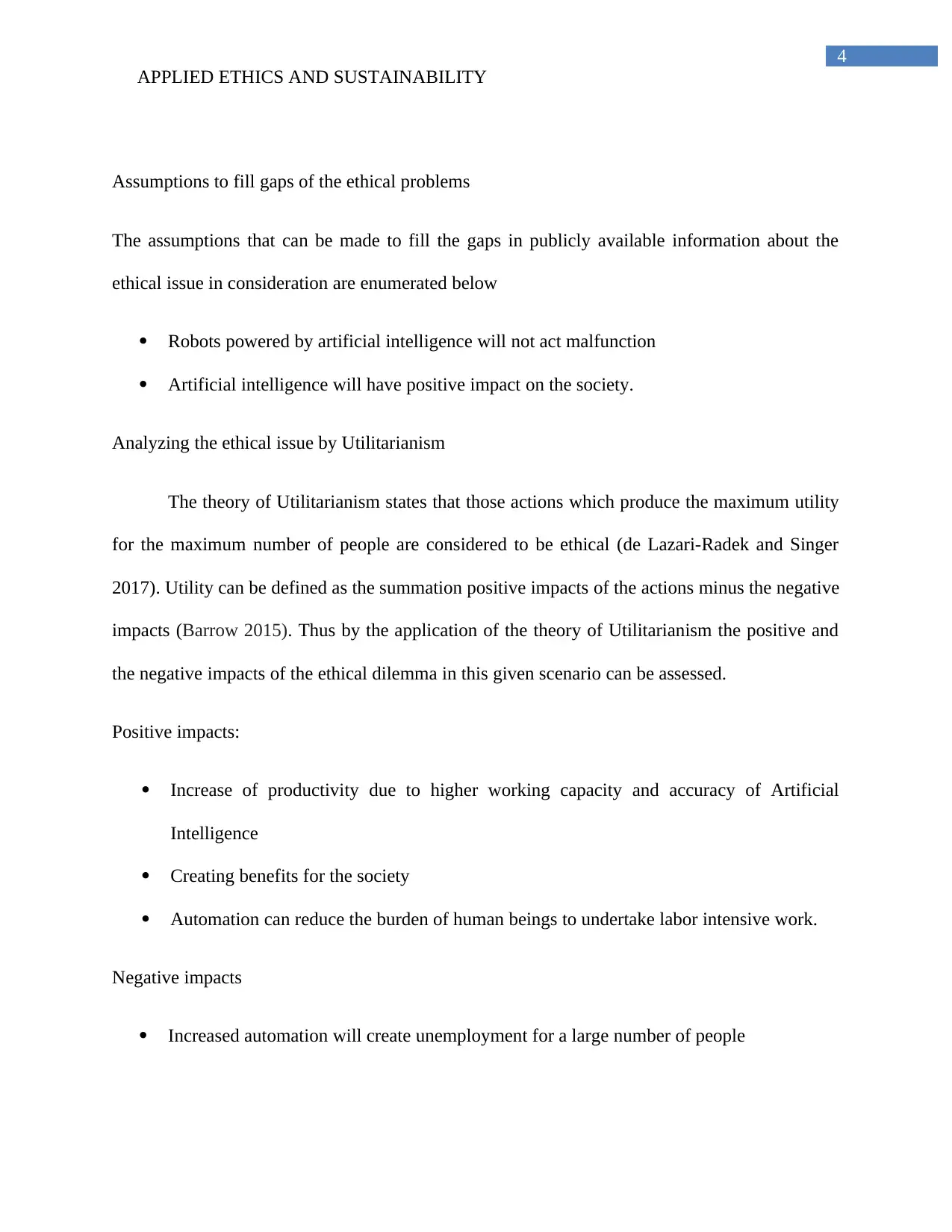
4
APPLIED ETHICS AND SUSTAINABILITY
Assumptions to fill gaps of the ethical problems
The assumptions that can be made to fill the gaps in publicly available information about the
ethical issue in consideration are enumerated below
Robots powered by artificial intelligence will not act malfunction
Artificial intelligence will have positive impact on the society.
Analyzing the ethical issue by Utilitarianism
The theory of Utilitarianism states that those actions which produce the maximum utility
for the maximum number of people are considered to be ethical (de Lazari-Radek and Singer
2017). Utility can be defined as the summation positive impacts of the actions minus the negative
impacts (Barrow 2015). Thus by the application of the theory of Utilitarianism the positive and
the negative impacts of the ethical dilemma in this given scenario can be assessed.
Positive impacts:
Increase of productivity due to higher working capacity and accuracy of Artificial
Intelligence
Creating benefits for the society
Automation can reduce the burden of human beings to undertake labor intensive work.
Negative impacts
Increased automation will create unemployment for a large number of people
APPLIED ETHICS AND SUSTAINABILITY
Assumptions to fill gaps of the ethical problems
The assumptions that can be made to fill the gaps in publicly available information about the
ethical issue in consideration are enumerated below
Robots powered by artificial intelligence will not act malfunction
Artificial intelligence will have positive impact on the society.
Analyzing the ethical issue by Utilitarianism
The theory of Utilitarianism states that those actions which produce the maximum utility
for the maximum number of people are considered to be ethical (de Lazari-Radek and Singer
2017). Utility can be defined as the summation positive impacts of the actions minus the negative
impacts (Barrow 2015). Thus by the application of the theory of Utilitarianism the positive and
the negative impacts of the ethical dilemma in this given scenario can be assessed.
Positive impacts:
Increase of productivity due to higher working capacity and accuracy of Artificial
Intelligence
Creating benefits for the society
Automation can reduce the burden of human beings to undertake labor intensive work.
Negative impacts
Increased automation will create unemployment for a large number of people
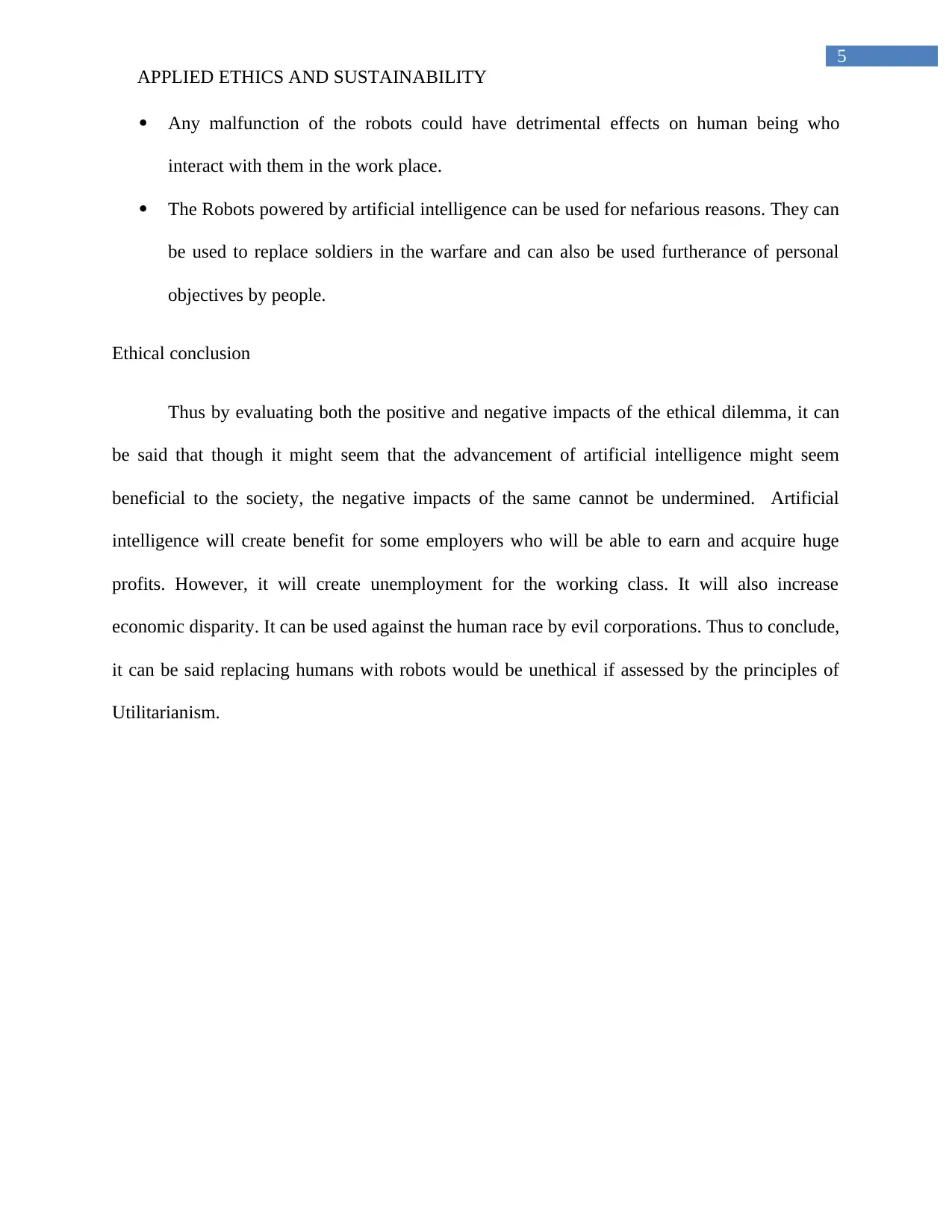
5
APPLIED ETHICS AND SUSTAINABILITY
Any malfunction of the robots could have detrimental effects on human being who
interact with them in the work place.
The Robots powered by artificial intelligence can be used for nefarious reasons. They can
be used to replace soldiers in the warfare and can also be used furtherance of personal
objectives by people.
Ethical conclusion
Thus by evaluating both the positive and negative impacts of the ethical dilemma, it can
be said that though it might seem that the advancement of artificial intelligence might seem
beneficial to the society, the negative impacts of the same cannot be undermined. Artificial
intelligence will create benefit for some employers who will be able to earn and acquire huge
profits. However, it will create unemployment for the working class. It will also increase
economic disparity. It can be used against the human race by evil corporations. Thus to conclude,
it can be said replacing humans with robots would be unethical if assessed by the principles of
Utilitarianism.
APPLIED ETHICS AND SUSTAINABILITY
Any malfunction of the robots could have detrimental effects on human being who
interact with them in the work place.
The Robots powered by artificial intelligence can be used for nefarious reasons. They can
be used to replace soldiers in the warfare and can also be used furtherance of personal
objectives by people.
Ethical conclusion
Thus by evaluating both the positive and negative impacts of the ethical dilemma, it can
be said that though it might seem that the advancement of artificial intelligence might seem
beneficial to the society, the negative impacts of the same cannot be undermined. Artificial
intelligence will create benefit for some employers who will be able to earn and acquire huge
profits. However, it will create unemployment for the working class. It will also increase
economic disparity. It can be used against the human race by evil corporations. Thus to conclude,
it can be said replacing humans with robots would be unethical if assessed by the principles of
Utilitarianism.
⊘ This is a preview!⊘
Do you want full access?
Subscribe today to unlock all pages.

Trusted by 1+ million students worldwide
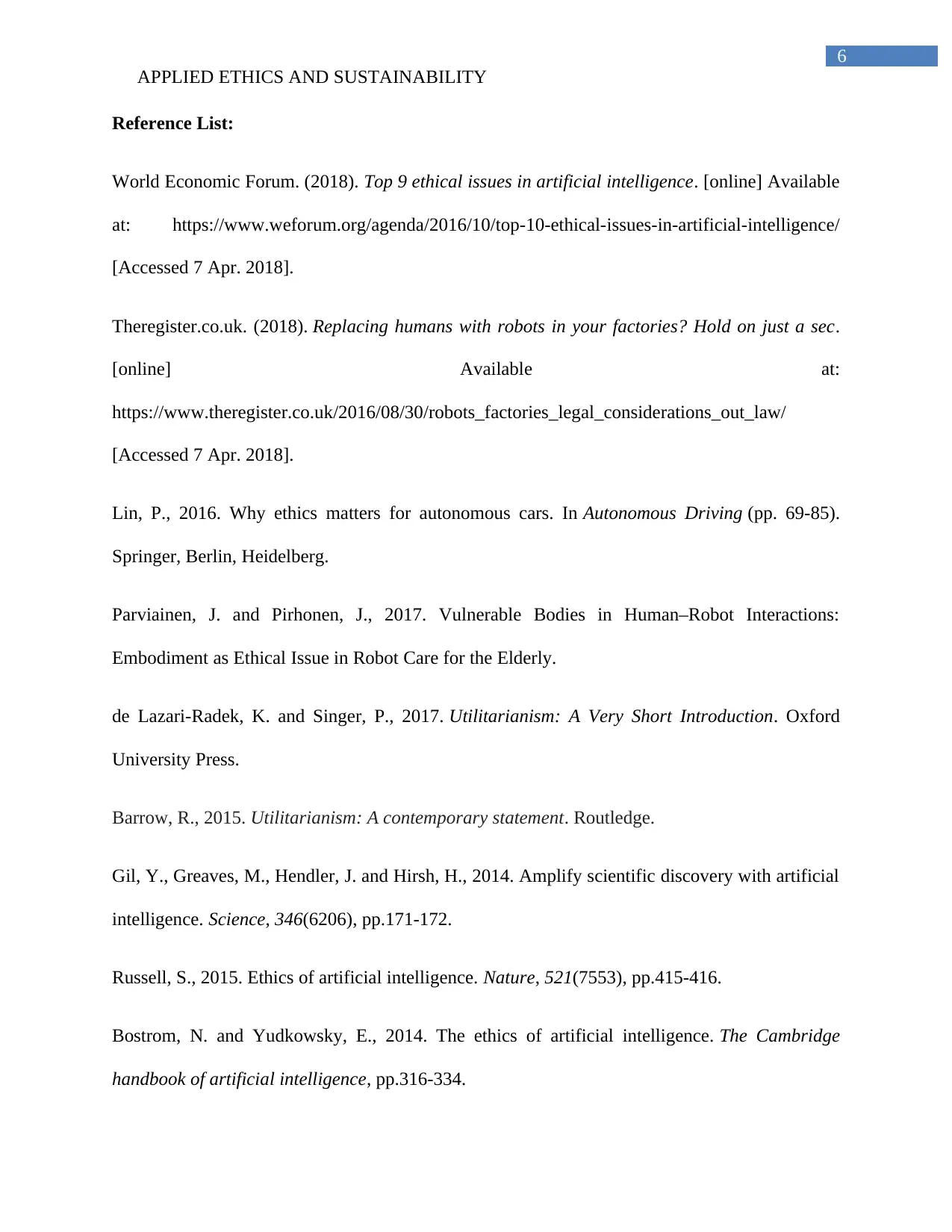
6
APPLIED ETHICS AND SUSTAINABILITY
Reference List:
World Economic Forum. (2018). Top 9 ethical issues in artificial intelligence. [online] Available
at: https://www.weforum.org/agenda/2016/10/top-10-ethical-issues-in-artificial-intelligence/
[Accessed 7 Apr. 2018].
Theregister.co.uk. (2018). Replacing humans with robots in your factories? Hold on just a sec.
[online] Available at:
https://www.theregister.co.uk/2016/08/30/robots_factories_legal_considerations_out_law/
[Accessed 7 Apr. 2018].
Lin, P., 2016. Why ethics matters for autonomous cars. In Autonomous Driving (pp. 69-85).
Springer, Berlin, Heidelberg.
Parviainen, J. and Pirhonen, J., 2017. Vulnerable Bodies in Human–Robot Interactions:
Embodiment as Ethical Issue in Robot Care for the Elderly.
de Lazari-Radek, K. and Singer, P., 2017. Utilitarianism: A Very Short Introduction. Oxford
University Press.
Barrow, R., 2015. Utilitarianism: A contemporary statement. Routledge.
Gil, Y., Greaves, M., Hendler, J. and Hirsh, H., 2014. Amplify scientific discovery with artificial
intelligence. Science, 346(6206), pp.171-172.
Russell, S., 2015. Ethics of artificial intelligence. Nature, 521(7553), pp.415-416.
Bostrom, N. and Yudkowsky, E., 2014. The ethics of artificial intelligence. The Cambridge
handbook of artificial intelligence, pp.316-334.
APPLIED ETHICS AND SUSTAINABILITY
Reference List:
World Economic Forum. (2018). Top 9 ethical issues in artificial intelligence. [online] Available
at: https://www.weforum.org/agenda/2016/10/top-10-ethical-issues-in-artificial-intelligence/
[Accessed 7 Apr. 2018].
Theregister.co.uk. (2018). Replacing humans with robots in your factories? Hold on just a sec.
[online] Available at:
https://www.theregister.co.uk/2016/08/30/robots_factories_legal_considerations_out_law/
[Accessed 7 Apr. 2018].
Lin, P., 2016. Why ethics matters for autonomous cars. In Autonomous Driving (pp. 69-85).
Springer, Berlin, Heidelberg.
Parviainen, J. and Pirhonen, J., 2017. Vulnerable Bodies in Human–Robot Interactions:
Embodiment as Ethical Issue in Robot Care for the Elderly.
de Lazari-Radek, K. and Singer, P., 2017. Utilitarianism: A Very Short Introduction. Oxford
University Press.
Barrow, R., 2015. Utilitarianism: A contemporary statement. Routledge.
Gil, Y., Greaves, M., Hendler, J. and Hirsh, H., 2014. Amplify scientific discovery with artificial
intelligence. Science, 346(6206), pp.171-172.
Russell, S., 2015. Ethics of artificial intelligence. Nature, 521(7553), pp.415-416.
Bostrom, N. and Yudkowsky, E., 2014. The ethics of artificial intelligence. The Cambridge
handbook of artificial intelligence, pp.316-334.
Paraphrase This Document
Need a fresh take? Get an instant paraphrase of this document with our AI Paraphraser

7
APPLIED ETHICS AND SUSTAINABILITY
Russell, S.J. and Norvig, P., 2016. Artificial intelligence: a modern approach. Malaysia; Pearson
Education Limited,.
APPLIED ETHICS AND SUSTAINABILITY
Russell, S.J. and Norvig, P., 2016. Artificial intelligence: a modern approach. Malaysia; Pearson
Education Limited,.
1 out of 8
Related Documents
Your All-in-One AI-Powered Toolkit for Academic Success.
+13062052269
info@desklib.com
Available 24*7 on WhatsApp / Email
![[object Object]](/_next/static/media/star-bottom.7253800d.svg)
Unlock your academic potential
Copyright © 2020–2026 A2Z Services. All Rights Reserved. Developed and managed by ZUCOL.





